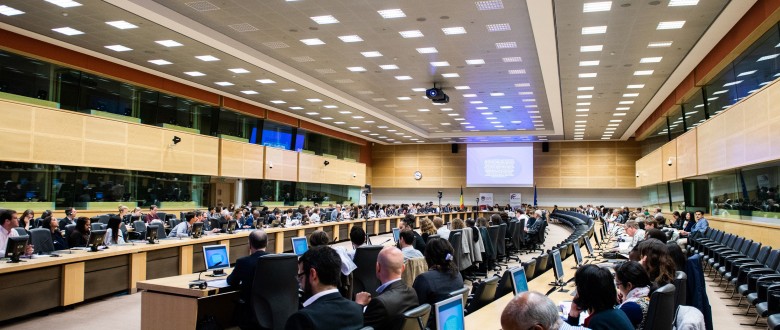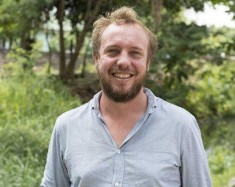
On 17 May, the Belgian platforms Be-cause health and Educaid.be jointly organised the international conference ‘Health and Education: Stronger Together’ on the intersection between health and education in international cooperation. VVOB was represented by Hans De Greve, education advisor in Suriname. He participated in the panel ‘Two Birds, One Stone’ focusing on school-related gender-based violence and comprehensive sexuality education.
Together with three distinguished co-panellists from Plan International, UNESCO and Makerere University, Hans explored the ways in which comprehensive sexuality education (CSE) and addressing school-related gender-based violence (SRGBV) contribute to better sexual and reproductive health and education outcomes for children and adolescents. Addressing enabling factors, challenges and the interlinkages between both concepts, it turned out to be a very interesting afternoon indeed.

Why do you think Educaid.be and Be-cause health asked VVOB to participate in this particular panel?
Hans: In Suriname, VVOB and several local civil society organisations are currently implementing the EU-co-funded iGROW-project. We work together to support lower secondary vocational schools to become safe and supporting environments for vulnerable, low-skilled adolescents – schools free from psychological, physical and sexual violence.
Especially sexual violence is a very serious problem in Suriname’s lower secondary schools, for a number of reasons. First, many students from these schools come from very difficult backgrounds and are exposed to violent behaviour in their personal lives. Second, sexuality and sexuality education are still very touchy subjects in Suriname, and students don’t really have access to proper information. Thirdly, stubborn traditional gender identities, norms and roles still negatively influence young peoples’ experience of sexuality. Moreover, the student population in these schools is very heterogeneous, with a large proportion of demotivated, low-skilled and overage learners. When students in different stages of their sexual development are in the same classroom, some risky situations might occur.
Almost every teacher or school leader can tell you stories of unsafe and violent sexual behaviour happening in or around schools, between students, or even between teachers and students. Even though almost everybody in the education system is in some way aware of this problem, more needs to be done to tackle this form of school-related violence.
As a result, a lot of the work we do in the iGROW-project is related to sexual violence and the ways in which gender identities, norms and roles as well as adolescents’ views and perspectives of sexuality contribute to the incidence of sexual violence in schools. The panel at the conference was an ideal forum to share the experiences and knowledge we’ve gathered over the years working in Suriname.
The panel was called ‘Two Birds, One Stone’, referring to the linkages between CSE and SRGBV. Can you explain some of the points you made during the discussions?
One of the main assumptions of the iGROW-project, based on our experience of the Suriname context, is that working on reducing school-related gender-based violence starts with a better understanding of healthy, safe and respectful sexual and equal gender relations amongst students, teachers, parents, and so on. As a result (comprehensive) sexuality education is absolutely crucial for the prevention of school-related sexual violence. I was happy to hear that the contributions of the other panellist echoed this opinion.
Another related point that I made was the importance of adopting a school-wide approach to SRGBV. Not only working with students, but also ensuring that parents, teachers and school leaders have the necessary skills to help prevent and deal with school-related sexual violence. In the iGROW-project for instance, teachers are supported to recognise transgressive sexual behaviour of students and are given concrete tools to deal with this type of student behaviour in such a way that students can learn from their behaviour. In the iGROW-project we have had some great results in this regard, by using the Sensoa Flag system.
A final point we made from our Suriname experience was to stress the importance of gender awareness in the prevention of school-related violence. Many, if not all forms of school-related violence are gendered. Perceptions and convictions about gender influence the way in which children are affected by violence. For organisations implementing programmes on school violence, this implies investing a lot of time and effort in developing a very thorough understanding of the role gender identities and norms play in violence at schools; not only with the different target groups, but also amongst their own staff and external facilitators.
A lot of the points you made during the panel came from practice. The panel also focused on the policy aspects of SRGBV and CSE. What can we take away from the Suriname case regarding policy?
In our experience, SRGBV programming inevitably runs against policy sensitivities at various levels.
For instance, our pedagogical approach to SRGBV encourages students to learn about their sexuality and learn from the mistakes they make. But that doesn’t always align with:
- school regulations on student-student relations on school grounds (no holding hands, no sitting on each other’s lap, …);
- policy of the education inspection on reporting cases of sexual behaviour to the judiciary. For instance, does the inspection have to report every case of sexual behaviour to the judiciary, even if both students consent, just because it might not be following the letter of the law?
- laws (or the interpretation of laws) regarding the age of legal consent.
As a consequence, it’s important to maintain open communication channels, build broad support and work with well-positioned allies. This to make sure that the programme is accepted and – in the long run – that the programme can also influence these levels of policy. In other words, practice can challenge policy. It is important to be aware of this and seize opportunities when they arise.
Picture copyright: Belgium Foreign Affairs, Foreign Trade and Development Cooperation
You can find more pictures of the 'Health and Education: Stronger Together'-conference on the Flickr-page of the Belgian Affairs ministry.




